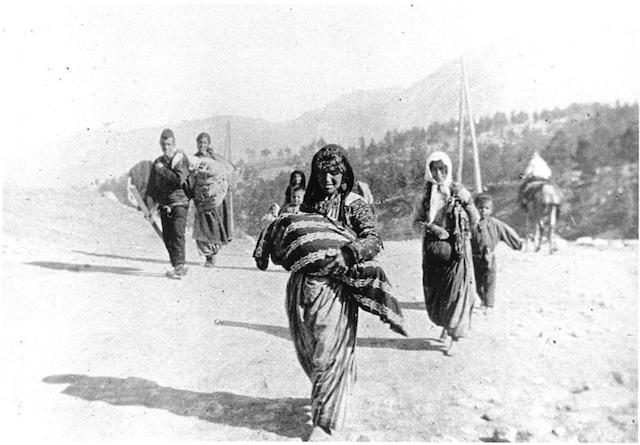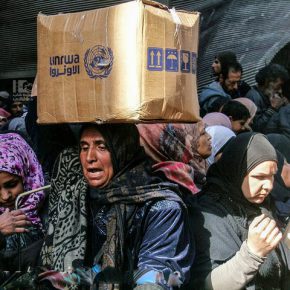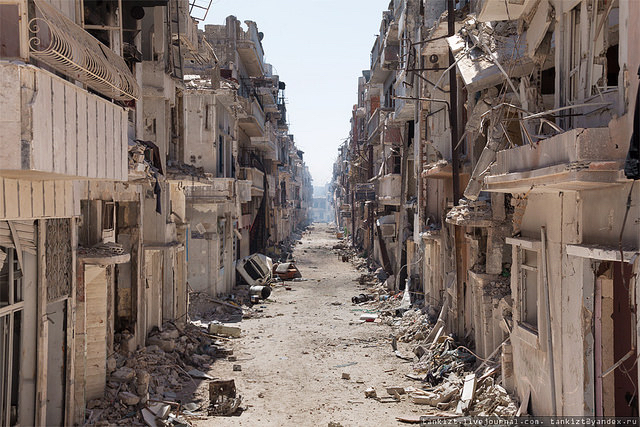Between the 10th and the 30th May, 1,200 of the most prominent Armenians and other Christians, without distinction of confession, were arrested in the Vilayets of Diyarbakir and Mamouret-ul-Aziz.
It is said that in Diyarbakir five or six priests were stripped naked one day, smeared with tar, and dragged through the streets. It is said that they were to be taken to Mosul, but nothing more has been heard of them.
In the Vilayet of Aleppo they have evicted the inhabitants of Hadjin, Shar, Albustan, Göksoun, Tasholouk, Zeitoun, all the villages of Alabash, Geben, Shivilgi, Furnus and the surrounding villages, Fundadjak, Hassan-Beyli, Harni, Lappashli, Dört Yöl and others..
They have marched them off in convoys into the desert on the pretext of settling them there. In the village of Tel-Armen (along the line of the Baghdad railway, near Mosul) and in the neighbouring villages about 5,000 people were massacred, leaving only a few women and children.
The people were thrown alive down wells or into the fire. They pretend that the Armenians are to be employed in colonising land situated at a distance of twenty-four to thirty kilometres from the Baghdad railway. But as it is only the women and children who are sent into exile, since all the men, with the exception of the very old, are at the war, this means nothing less than the wholesale murder of the families, since they have neither the labour nor the capital for clearing the country.
A German met a Christian soldier of his acquaintance, who was on furlough from Jerusalem. The man was wandering up and down along the banks of the Euphrates searching for his wife and children, who were supposed to have been transferred to that neighbourhood.

Such unfortunates are often to be met with in Aleppo, because they believe that there they will learn something about the whereabouts of their relations. It has often happened that when a member of a family has been absent, he discovers on his return that all his family are gone—evicted from their homes.
For a whole month corpses were observed floating down the River Euphrates nearly every day, often in batches of from two to six corpses bound together. The male corpses are in many cases hideously mutilated (sexual organs cut off, and so on), the female corpses are ripped open.
The Turkish military authority in control of the Euphrates, the Kaimakam of Djerablous, refuses to allow the burial of these corpses, on the ground that he finds it impossible to establish whether they belong to Moslems or to Christians. He adds that no one has given him any orders on the subject.
The corpses stranded on the bank are devoured by dogs and vultures. To this fact there are many German eye-witnesses. An employee of the Baghdad railway has brought the information that the prisons at Biredjik are filled regularly every day and emptied every night—into the Euphrates. Between Diyarbakir and Ourfa a German cavalry captain saw innumerable corpses lying unburied all along the road.
The following telegram was sent to Aleppo from Diyarbakir:—“We have accepted the True Religion. Now we are all right.” The inhabitants of a village near Anderoum went over to Islam and were allowed to stay. At Hadjin six families wanted to become Mohammedans. They were told: “Nothing under one hundred families will be accepted.”

Aleppo and Ourfa are the assembling-places for the convoy of exiles. There were about 5,000 of them in Aleppo during June and July, while during the whole period from April to July many more than 50,000 must have passed through the city. The girls were abducted almost without exception by the soldiers and their Arab hangers-on. One father, on the verge of despair, besought me to take with me at least his fifteen-year-old daughter, as he could no longer protect her from the persecutions inflicted upon her. The children left behind by the Armenians on their journey are past counting.
Women whose pains came upon them on the way had to continue their journey without respite. A woman bore twins in the neighbourhood of Aintab; next morning she had to go on again. She very soon had to leave the children under a bush, and a little while after she collapsed herself. Another, whose pains came upon her during the march, was compelled to go on at once and fell down dead almost immediately. There were several more incidents of the same kind between Marash and Aleppo.
The villagers of Shar were permitted to carry all their household effects with them. On the road they were suddenly told: “An order has come for us to leave the high road and travel across the mountains.” Everything—waggons, oxen and belongings—had to be left behind on the road, and then they went on over the mountains on foot. This year the heat has been exceptionally severe, and many women and children naturally succumbed to it even in these early stages of their journey.
There are about 30,000 exiles of whom we have no news at all, as they have arrived neither at Aleppo nor at Ourfa.
Adapted from the anthology Germany, Turkey and Armenia (1917). Photographs of the Armenian genocide courtesy of The Boston Globe, the National Genocide Institute, and The Duran.com. All rights reserved.





